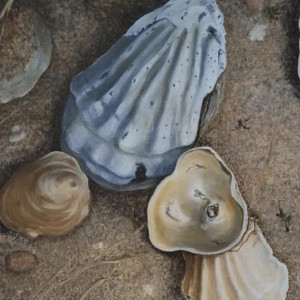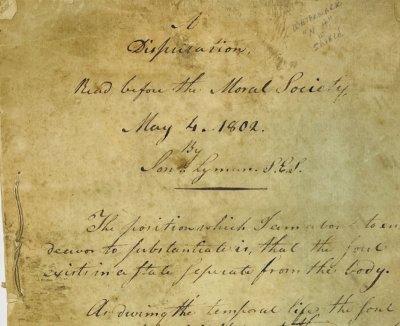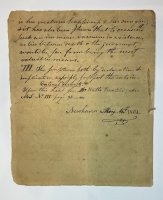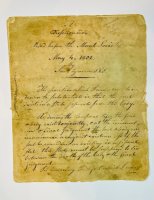John Bale Books LLC
Lyman, Samuel.
MANUSCRIPT A Disputation, Read before the Moral Society, May 4, 1802.
The Immortality of the Soul Defended Citing Native Beliefs, Brahmins, and Mahometans
SOLD
Item Details
Lyman, Samuel (1749–1802)?*
A Disputation, Read before the Moral Society, May 4, 1802.
Autograph manuscript, 8 leaves (16 pp. ), stitched, ink on laid paper with “NH | Shield” watermark. Light edgewear, minor stains to outer leaves, generally clean and legible.
A significant unpublished theological manuscript composed at Yale in the spring of 1802—coinciding almost exactly with the outbreak of the famed Yale Revival that marked the dawn of evangelical dominance at the college. In this disputation, read before the newly formed Moral Society on May 4, 1802, Lyman (Yale 1770) argues in defense of the soul’s continued existence between death and final judgment. The Moral Society, established by Yale undergraduates in 1801 to resist the tide of Enlightenment rationalism on campus, was a crucible for the spiritual transformations that would erupt in full just weeks after this manuscript was read.
Lyman—Federalist, jurist, and brother to Yale professor Moses Lyman—constructs a tripartite argument:
I. That belief in the soul’s separate state “has been the received opinion of mankind in all ages of the world”;
II. That the contrary view would “be derogatory to the wisdom and benevolence of God”;
III. That “the Scriptures both by declaration & implication expressly support the doctrine.”
Drawing from classical literature, world religions, and indigenous cosmologies, Lyman’s essay reflects a syncretic but deeply orthodox defense of Christian metaphysics. He cites Virgil, Homer, and Goldsmith alongside Quranic and Brahmanical beliefs. Especially noteworthy is his inclusion of Indigenous American traditions in support of his universalist claim:
“The Greenlanders, the Esquimaux, & other numerous tribes of North American Indians, are firm in the belief that without their trappings of honor & their warlike instruments the souls of their departed friends will find but a disagreeable residence in the world of spirits.”
Islam and Hinduism are likewise invoked:
“If a Mahometan were asked what would become of his soul after death, he would reply that the mighty Allah would receive it to himself into his heavenly Paradise.”
“Transmigration, a principal tenet of the Brahmans, bears too evident an analogy to the doctrine for which I am contending to need a comment.”
While Lyman draws confidently from these traditions to argue for a shared human intuition of immortality, he notably omits any reference to African or African diasporic spiritual systems—revealing both the theological inclusivity and racial limitations typical of Enlightenment-era religious thought in the early Republic.
Delivered scarcely a month before his death on June 5, 1802, this manuscript stands at a transitional moment in Yale’s—and America’s—religious history. The revival that followed would sweep away the deistic skepticism Lyman critiques, making evangelicalism the new spiritual center of Yale and contributing to the Second Great Awakening nationwide. According to recent studies, the 1802 Revival led one-third of Yale’s student body to profess new or renewed faith in Christ, including future revivalist Lyman Beecher and chemist Benjamin Silliman.
A blend of Enlightenment-era reasoning and early evangelical concern, this manuscript captures the pulse of moral anxiety and spiritual reform that defined the Yale Revival—and offers a rare, firsthand artifact from its prelude.
References:
— The Phi Beta Kappa Key, Vol. 7, No. 2 (1929), p. 100 (Jeremiah Evarts’ diary)
— History of the City of New Haven, p. 68 (Moral Society Library)
— Revival Library, “1802 Revival at Yale University”
— Find A Grave Memorial ID 106263082 (Samuel Lyman)
NOTE:
While the manuscript is signed “Sam. Lyman S. Esq.” and was read in New Haven on May 4, 1802—just weeks before the death of Hon. Samuel Lyman (1749–1802), Yale graduate and Federalist Congressman—the attribution remains strongly suggestive but not definitively confirmed. The erudition, tone, and context align with Lyman’s known biography, and no other matching candidate has been identified.
Related terms: Samuel Lyman, Yale College, 1802 Revival, Second Great Awakening, Moral Society, early American manuscript, soul, immortality, comparative religion, Enlightenment theology, evangelicalism, Native American spirituality, Timothy Dwight, Benjamin Silliman, manuscript Americana, New Haven, eschatology.
John Bale Books LLC
Dan Gaeta
94 West Walk
West Haven, CT, 06516
United States
Phone: 203-232-4338
Cell: 203-232-4338
Featured Catalogue
Visit Website

More Information
Booth 21
Shipping and Returns
Discounts for trade. Text, email, or call to either purchase, hold or inquire about any or multiple items. Domestic shipping $8. Contact us for international or premium shipping options. Be sure to check out our weekly book auction on USIANA.COM
Open Times
Text any time, email if it’s not pressing. 203-232-4338Additional Information
John Bale Book Co. has permanently closed its Waterbury store. Returns and any correspondence should be sent to our mailing address: 94 West Walk, West Haven, CT 06702. Logo artwork by Edith Reynolds, https://www.edithreynolds.com/ Please note—We no longer run an open shop—this is neither a shop address nor a warehouse. Thank you.
Check out our weekly sales through a local auction company— low starting prices, no reserve, with shipping options.



